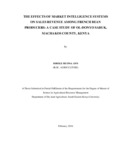| dc.description.abstract | Businesses operate in a world in which information is more readily and publicly available than ever before. Thanks to the development of the Internet, information on market trends, legislation, customers, suppliers, competitors, distributors, product development and almost every other conceivable topic is available at the click of a mouse. Search engines, online libraries, company websites and other sources provide information in an increasingly plentiful, easy to find, and easy to digest way. Small-scale farmers continue to sell their French beans to middlemen at throw away prices yet there are exporting companies that can buy their beans at high prices for profitability. This has been brought about by the possible missing information about the French beans marketing trends and the profitability of the crop, limited access to the necessary capital to make the switch possible, poor infrastructure necessary to bring the crops to export outlets, high risk of the export markets (for instance, from hold-up problems selling to exporters), limited human capital necessary to adopt successfully a new agricultural technology, for instance the Global Good Agricultural Practices (GlobalGAP) and Maximum Residue Levels (MRLs)requirements, and misperception by researchers and policy makers about the true profit opportunities and risk of crops grown for export markets. This study was conducted to assess the impact of market intelligence systems on sales revenue of French bean farmers in Ol-Donyo Sabuk of Machakos County, Kenya. To achieve this overall objective, three specific objectives were addressed, namely; (1) to establish the existing French beans marketing channels in Ol-Donyo Sabuk, (2) to compare the sales revenues of French bean farmers with and without market intelligence systems, and (3) to compare return on capital for different actors within the French bean value chain. Systemic random sampling was used to select 120 farmers for this study. Data were collected through administering questionnaire for personal interviews. Data analysis was carried out using descriptive statistics such as percentages, and means to answer the stated objectives. In addition, statistical package for social sciences (SPSS) was used to analyse data. The study revealed that 30 percent of the 120 sampled French bean producers had access to French bean market intelligence systems, which is a small proportions of farmers compared to those who did not have access. The results revealed that 30 percent of the 120 sampled French bean producers were selling their produce as a group and had access to market intelligence systems 70 percent of the 120 sampled French bean producers not having access to market intelligence systems thus selling their produce to brokers. The results showed that group farmers selling their product to exporters had a higher return on capital as compared to individual farmers selling their produce to middlemen.
xiii
Based on the results of this study, it is recommended that the government and other key players in the horticulture industry enhance extension services to French bean producers by training them on market intelligence systems and stringent EU market requirements in order to improve on sales revenues from the crop and subsequent return on capital. Further the government establishes a French beans value addition plant that will cater for all farmers in French beans production and a high return on capital will go to Kenya economy but not to foreigners who own most of the value addition plants. This will too provide employment to many. The brokers should be removed from the production chain because they misuse farmers making profits where they did not invest and exporters would be advised to improve on their mode of produce payment and produce rejection handling.There is need to do away with hawkers and brokers within the value chain by having binding contracts and steady markets. Based on the findings, policy implications were drawn for improvingthe quality of French beans immensely by farmers through complying with GlobalGAP right from land preparation to harvesting and adhering to stipulated MRLs, proper postharvest handling of the produce with thorough grading and subsequent proper storage. | en_US |

